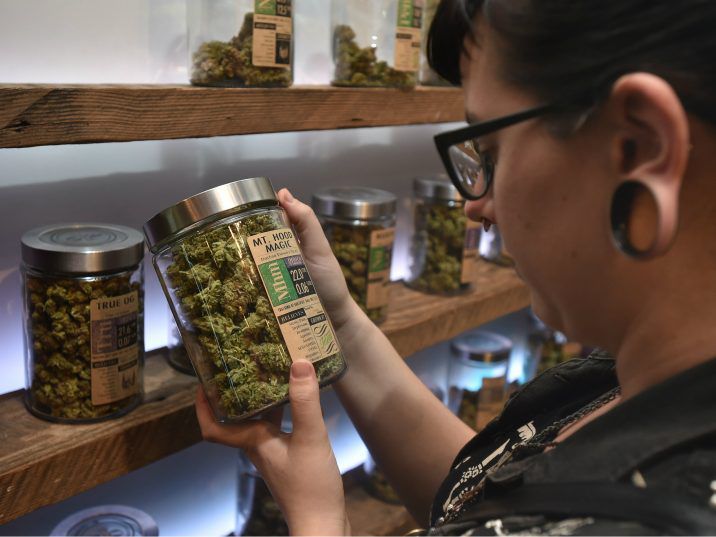Cannabis sales are booming. Will it last?

The products that have been flying off the shelves during the COVID-19 pandemic are, more or less, what you might expect. The dearth of toilet paper has been well-documented. Canned goods are the focus of most grocery store trips. So too are cleaning supplies.
But cannabis — something that was illegal less than two years ago, and remains federally illegal in the US — has become one of North America’s most sought after items.
It has helped that jurisdictions across the continent have declared cannabis companies are essential services, but as customers stock-up to their legal limits, and a recession looms on the horizon, the question the industry is now trying to answer is whether or not these sales can last.
According to BDS Analytics, a Colorado-based cannabis market research company, nearly 95 per cent of cannabis retailers in North America have reported an increase in sales. Many are categorizing the spike “as busy, or busier than 4/20,” says Greg Shoenfeld, vice president and chief analyst at BDS.
Cannabis flower, in particular, is in high demand. “Consumers are buying in larger formats,” Shoenfeld says. “A lot of ounces are going out the door, not as many eighths or grams.” Edibles are also selling quickly.
In Canada, sales peaked on Friday, March 13, climbing 22 per cent compared to the previous weekend. Usually, sales spike on the weekend and then slow down during the week, but Monday the 16th brought another weekend-like surge in sales. Customers are also spending more, on average, with each trip.
The US is mirroring the same peaks as Canada, though it’s generally trailing a few days behind and the duration of sales surges are lasting a bit longer.
While sales are booming, BDS says that nearly 60 percent of retailers across North America have indicated they are experiencing staffing challenges.
Some shops are attempting to mitigate this by encouraging customers to order online and then pick up at the store, streamlining the process. In Canada, calls for legalizing cannabis delivery services are growing louder. Aside from Manitoba, Saskatchewan, and select regions of Ontario, delivery remains prohibited in much of the country.
The supply chain is another concern, though Shoenfeld says it remains “robust.” Around 80 per cent of retailers surveyed have not run into any issues with product shortages. The 20 per cent who have, Shoenfeld says, are referring to things like cleaning supplies and some of the packaging and accessories that are manufactured in China.
“By and large, cannabis products are available,” he says. “As long as stores can stay open, there should be products to sell and hopefully we don’t have any toilet paper type situations.”
With many customers already stocked-up, and job losses mounting, BDS is trying to determine whether or not cannabis sales have plateaued, and what the future could hold for the legal cannabis industry. A money crunch could also drive customers back to the illicit market.
Consumers are reverting to old habits, according to Larry Levin, the executive vice president of market and shopper intelligence at IRI, a Chicago-based market research company.
“Consumers are likely to be sticking to what they know,” he says, before expanding that people are turning to shelf-stable products and products from their youth, like Kraft Dinner. Pasta sales are up 230 per cent from a year ago, according to IRI’s data.
For cannabis, the top drivers are low price, high THC percentage, and taste and flavour. Product availability, and whether or not consumers have money to spend, or can even leave their homes in the weeks ahead, are all factors to consider looking forward, says Jessica Lukas, the vice president of consumer insights at BDS.
“There’s really nothing in the recent years and decades that we can compare this to.”
420 Intel is Your Source for Marijuana News
420 Intel Canada is your leading news source for the Canadian cannabis industry. Get the latest updates on Canadian cannabis stocks and developments on how Canada continues to be a major player in the worldwide recreational and medical cannabis industry.
420 Intel Canada is the Canadian Industry news outlet that will keep you updated on how these Canadian developments in recreational and medical marijuana will impact the country and the world. Our commitment is to bring you the most important cannabis news stories from across Canada every day of the week.
Marijuana industry news is a constant endeavor with new developments each day. For marijuana news across the True North, 420 Intel Canada promises to bring you quality, Canadian, cannabis industry news.
You can get 420 Intel news delivered directly to your inbox by signing up for our daily marijuana news, ensuring you’re always kept up to date on the ever-changing cannabis industry. To stay even better informed about marijuana legalization news follow us on Twitter, Facebook and LinkedIn.




